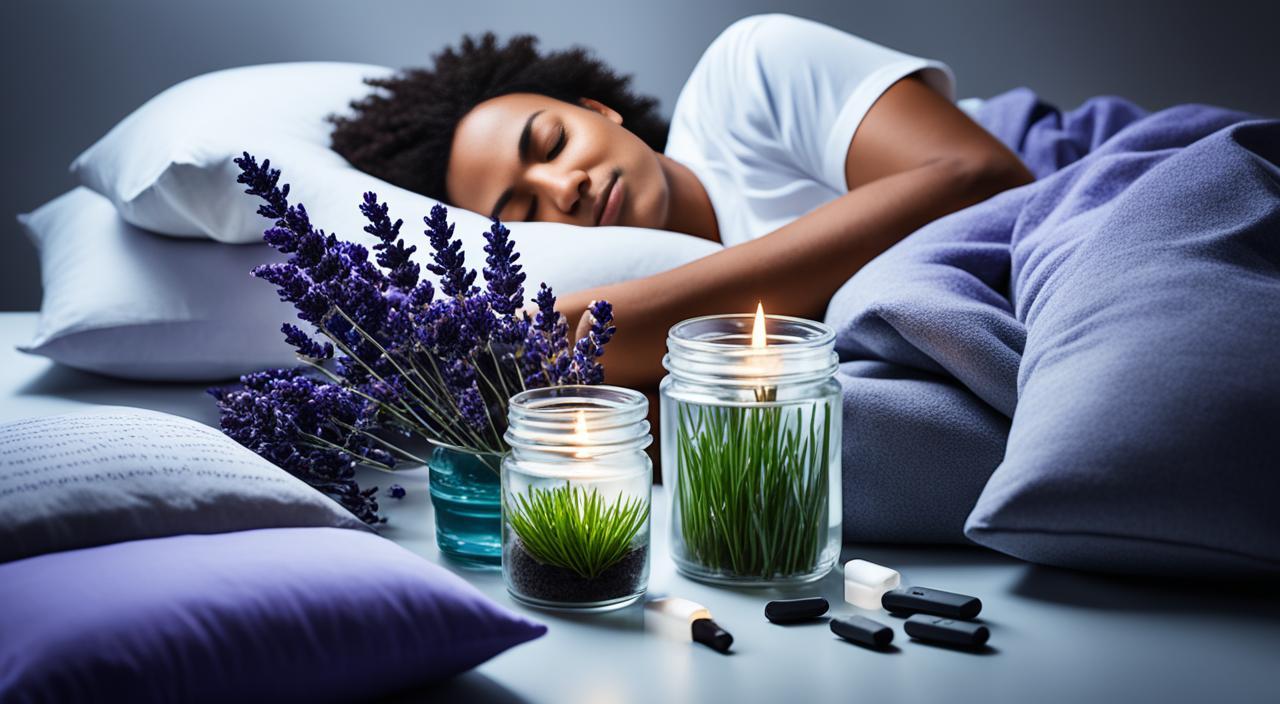Medically reviewed by Dr Chandril Chugh,
Renowned Neurologist and American Trained Specialist
Are you tired of tossing and turning every night? Do you wake up feeling groggy and exhausted? It’s time to take control of your sleep and prioritize your well-being. In this article, we will share evidence-based tips for better sleep that will help you improve sleep quality and develop healthy sleep habits.
Poor sleep can have a profound impact on your overall health, hormones, exercise performance, and brain function. On the other hand, good sleep is critical for weight management, mental clarity, and overall vitality.
So, let’s dive into these tips and start our journey towards a restful and rejuvenating slumber.
Increase Bright Light Exposure During the Day
Your circadian rhythm, which regulates your sleep-wake cycle, is affected by natural sunlight or bright light during the day. Daily bright light exposure can improve sleep quality and duration, especially for those with insomnia or severe sleep issues.
Bright light exposure during the day helps synchronize your circadian rhythm, making it easier to fall asleep at night and wake up in the morning. The intensity and duration of light exposure are crucial factors in regulating your internal body clock.
“Bright light exposure can improve quality of sleep and sleep duration, especially for those with insomnia or sleep related issues.” Dr. Chandril Chugh
A study published in the Journal of Clinical Sleep Medicine found that bright light exposure in the morning reduced the time it took for participants with insomnia to fall asleep by 83%. It also increased their total sleep time by 21 minutes.( reference??)
To increase your bright light exposure during the day, consider the following tips:
- Spend time outdoors in natural sunlight, such as taking a walk or sitting in a park.
- Open curtains or blinds to let natural light into your home or workspace.
- Position yourself near windows whenever possible to maximize exposure to natural light.
- If natural light is limited, consider using bright artificial light therapy devices or lightboxes.
Incorporating bright light exposure into your daily routine can have a significant impact on your sleep quality and overall well-being.
Reduce Blue Light Exposure in the Evening
Nighttime exposure to blue light from electronic devices can disrupt your circadian rhythm and interfere with melatonin production. Blue light emitted by smartphones, tablets, and computers can suppress the release of melatonin, a hormone that regulates sleep and wakefulness.
To improve your sleep quality and protect your circadian rhythm, here are some effective strategies to reduce blue light exposure in the evening:
Use Glasses that Block Blue Light
Special glasses that block blue light can be worn in the evening to filter out the harmful effects of blue light emitted by screens. These glasses can significantly reduce the impact of blue light on your circadian rhythm, allowing you to wind down and prepare for a good night’s sleep.
Install Apps that Filter Blue Light
There are several apps available for smartphones, tablets, and computers that can filter out blue light. These apps adjust the screen’s color palate to emit warmer tones, reducing the amount of blue light emitted. By installing these apps, you can reduce the negative effects of blue light on your sleep quality.
Avoid Bright Lights and Screens Before Bedtime
As part of your bedtime routine, it’s essential to avoid exposure to bright lights and screens at least one to two hours before going to bed. Replace bright overhead lights with dimmer options or use lamps with warm-colored bulbs. Additionally, refrain from using electronic devices, such as smartphones and tablets, during this period. Instead, engage in relaxing activities, such as reading a book or taking a bath, to prepare your body and mind for sleep.
By incorporating these simple steps into your evening routine, you can effectively reduce your nighttime exposure to blue light, protect your circadian rhythm, and promote better sleep.
Avoid Consuming Caffeine Late in the Day
Consuming caffeine, especially late in the day, can have a negative impact on your sleep quality. Caffeine is a stimulant that activates the nervous system and can make it difficult to naturally relax and fall asleep. To ensure a restful night’s sleep, it’s best to avoid consuming large amounts of coffee or other caffeinated beverages in the late afternoon or evening.
If you’re a coffee lover and still want to enjoy a warm beverage during the evening, consider switching to decaffeinated alternatives. Decaffeinated coffee provides a similar taste without the stimulating effects of caffeine. This allows you to indulge in the comforting ritual of sipping a warm cup of coffee without compromising your sleep quality.
Caffeine Content in Popular Beverages
| Beverage | Caffeine Content (mg) |
|---|---|
| Coffee (8 oz) | 95-165 |
| Black tea (8 oz) | 25-48 |
| Green tea (8 oz) | 25-29 |
| Decaffeinated coffee (8 oz) | 2-5 |
As you can see from the table above, different beverages contain varying amounts of caffeine. If you’re sensitive to caffeine or aiming for a caffeine-free evening, opt for decaffeinated coffee or herbal tea options that do not contain caffeine. This small adjustment can make a big difference in ensuring a peaceful night’s sleep.
Opting for decaffeinated options enables you to relish the soothing tradition of indulging in a cozy cup of coffee without sacrificing the quality of your sleep.- Dr Chandril Chugh
By being mindful of your caffeine intake and making informed choices, you can prioritize good sleep and wake up feeling refreshed and revitalized.

Reduce Irregular or Long Daytime Naps
While short power naps can improve daytime brain function, it’s important to be mindful of your daytime napping habits to ensure optimal sleep quality. Long or irregular daytime naps can actually disrupt your sleep schedule and make it harder to fall asleep at night. This is because sleeping during the day may confuse your internal clock and throw off your body’s natural sleep-wake cycle.
If you find yourself having trouble falling asleep at night, it may be helpful to limit or shorten your daytime naps. By doing so, you can help regulate your sleep-wake cycle and improve your overall sleep quality. If you’re unsure how to go about adjusting your napping habits, consider the following tips:
- Avoid napping late in the day, especially close to your regular bedtime.
- Limit your nap duration to around 20-30 minutes to avoid entering deep sleep stages.
- Establish a consistent napping schedule, preferably at the same time each day.
- Create a comfortable and conducive environment for napping, such as a quiet, dark room.
By following these recommendations, you can ensure that your daytime napping habits support a better sleep quality at night and help you maintain a more consistent sleep-wake schedule.
The Impact of Daytime Napping on Sleep Quality
Long or irregular daytime napping can have a significant impact on your sleep quality. Research shows that excessive daytime napping can lead to sleep inertia, which is a state of grogginess and disorientation that occurs upon waking from a deep sleep.
Additionally, irregular daytime napping can interfere with the natural sleep-wake cycle by causing fragmented sleep patterns. This can make it difficult to achieve restorative deep sleep and may contribute to feelings of daytime sleepiness or fatigue.
On the other hand, short power naps taken earlier in the day can provide a boost of energy and improve focus and cognitive function. These brief naps can be especially beneficial for individuals who have had insufficient nighttime sleep due to work, travel, or other factors.
Napping Tips for a Better Night’s Sleep
Follow these tips to optimise your daytime napping habits and improve your sleep quality:
| Tip | Explanation |
| Avoid long naps | Limit your nap duration to around 20-30 minutes to avoid entering deep sleep stages, which can make it harder to wake up and disrupt your nighttime sleep. |
| Nap earlier in the day | Avoid napping too close to your regular bedtime to ensure that you’re sufficiently tired when it’s time to sleep at night. |
| Stick to a schedule | Establish a consistent napping schedule to regulate your body’s internal clock and sleep-wake cycle. |
| Create a conducive environment | Make sure your nap environment is quiet, dark, and comfortable, as these factors can enhance relaxation and ensure a more restful nap. |
By implementing these napping tips, you can strike a balance between reaping the benefits of daytime naps and maintaining optimal sleep quality at night.
Maintain Consistent Sleep and Wake Times
Your body’s sleep-wake cycle, also known as the circadian rhythm, thrives on consistency. By sticking to a regular sleep and wake schedule, you can optimise your sleep quality and promote a healthier sleep pattern.
Irregular sleep patterns disrupt the natural rhythm of your body, which can lead to decreased melatonin levels and difficulty falling asleep. However, when you establish a consistent sleep and wake time, even on weekends, you align your body’s internal clock and enhance your sleep-wake cycle.
When you maintain a regular sleep schedule, you may find that you wake up naturally without the need for an alarm. Waking up at the same time every day helps to regulate your body’s internal clock and promotes a more restful and refreshing sleep experience.
Maintaining a regular sleep schedule can help improve your sleep-wake cycle.
Consider Melatonin Supplements
When it comes to achieving a good night’s sleep, melatonin, the natural sleep hormone, plays a crucial role. Melatonin regulates the brain and determines when it’s time to relax and fall asleep. However, certain factors like stress, jet lag, or irregular sleep schedules can disrupt the body’s natural melatonin production.
In such cases, melatonin supplements can be a helpful aid in improving sleep quality and regulating the circadian rhythm. By taking melatonin supplements before bed, you can experience benefits like faster sleep onset and enhanced sleep duration.

To ensure optimal results, it is recommended to start with a low dosage and gradually increase as needed. Consulting with a healthcare provider before using melatonin supplements can provide personalized guidance based on your specific sleep needs.
The melatonin supplement market offers a wide range of options, including tablets, capsules, gummies, and even sublingual forms. It is important to choose a reputable brand that meets quality standards to ensure the effectiveness and safety of the supplement.
Remember, while melatonin supplements can be a valuable tool in promoting healthy sleep, it is essential to adopt a holistic approach to sleep hygiene. Incorporating other sleep-enhancing practices, such as maintaining a consistent sleep schedule and creating a sleep-friendly environment, can further optimize the benefits of melatonin supplementation.
Explore Other Sleep-Inducing Supplements
When it comes to improving sleep quality and promoting relaxation, sleep supplements can be a helpful addition to your bedtime routine. There are several supplements that have shown promising results in enhancing sleep. These include:
- Ginkgo biloba: This herbal supplement is known for its potential to reduce anxiety and promote quality sleep. It may also improve overall sleep duration.
- Glycine: An amino acid that can have a calming effect on the brain, glycine has been found to enhance sleep quality and reduce daytime sleepiness.
- Valerian root: Often used as a natural remedy for sleep disorders, valerian root can help improve sleep latency (the time it takes to fall asleep) and overall sleep quality.
- Magnesium: This mineral plays a crucial role in the regulation of sleep. Magnesium supplements have been shown to promote relaxation and deeper sleep.
- L-theanine: Found in green tea, L-theanine has been found to reduce anxiety and improve sleep quality by increasing relaxation and reducing stress.
- Lavender: The scent of lavender has a calming effect and can help induce sleep. It is commonly used in aromatherapy for its relaxing properties.
It’s important to note that the effectiveness of these supplements may vary from person to person. It’s recommended to experiment with each supplement one at a time to determine which ones work best for you. Additionally, it’s always a good idea to consult with a healthcare provider before incorporating any new supplements into your routine.
Adding sleep supplements to your sleep hygiene routine can provide an extra boost in promoting relaxation and improving sleep quality. However, it’s essential to maintain a healthy sleep environment and follow other evidence-based tips for better sleep to reap maximum benefits.
Conclusion
Getting a good night’s sleep is vital for overall health and well-being. By implementing these evidence-based tips and strategies, you can improve your sleep quality and wake up refreshed and ready to embrace the day.
Firstly, increasing bright light exposure during the day can help regulate your circadian rhythm and improve sleep quality. Aim to spend time in natural sunlight or use bright light therapy if necessary.
Secondly, reducing blue light exposure in the evening is crucial. Avoid electronic devices before bedtime, try blue light blocking glasses or apps, and create a relaxing environment with dim lights.
Thirdly, it’s important to avoid consuming caffeine late in the day. Opt for decaffeinated alternatives if needed, and be mindful of the potential impact of caffeine on your sleep quality.
In addition, limit or shorten daytime naps to prevent disruption to your sleep-wake cycle. Maintaining a consistent sleep and wake schedule, even on weekends, can also improve sleep hygiene.
Lastly, consider incorporating sleep-inducing supplements like melatonin or other natural aids into your routine after consulting with a healthcare professional.
By adopting these healthy sleep habits and prioritizing sleep hygiene, you can experience better sleep quality, enhance your overall well-being, and wake up each day feeling rejuvenated. Sweet dreams!
FAQ
How can I improve my sleep quality?
Making changes to your diet and lifestyle, such as increasing bright light exposure during the day, reducing blue light exposure in the evening, avoiding caffeine late in the day, reducing irregular or long daytime naps, maintaining consistent sleep and wake times, considering melatonin supplements, and exploring other sleep-inducing supplements, can all help improve sleep quality.
How does bright light exposure affect sleep quality?
Daily bright light exposure, especially from natural sunlight or bright light during the day, can improve sleep quality and duration, particularly for those with insomnia or severe sleep issues. It helps regulate the circadian rhythm, which is responsible for your sleep-wake cycle.
How does blue light exposure impact sleep quality?
Nighttime exposure to blue light from electronic devices can disrupt your circadian rhythm and interfere with the production of melatonin, a sleep hormone. To improve sleep, it is recommended to use glasses that block blue light, install apps that filter blue light, and avoid bright lights and screens before bedtime.
Does consuming caffeine affect sleep quality?
Yes, consuming caffeine, especially late in the day, can negatively impact sleep quality. Caffeine stimulates the nervous system, making it difficult to naturally relax and fall asleep. It is advisable to avoid consuming large amounts of coffee or caffeinated beverages in the late afternoon or evening, and opt for decaffeinated alternatives if needed.
Can daytime napping affect sleep quality?
While short power naps can improve daytime brain function, long or irregular daytime napping can disrupt sleep quality. Sleeping during the day may confuse your internal clock and make it harder to fall asleep at night. It is recommended to limit or shorten daytime naps if you have trouble sleeping at night.
How important is maintaining a consistent sleep and wake schedule?
Maintaining a regular sleep and wake schedule is crucial for optimizing sleep quality. Your body’s circadian rhythm functions best with a consistent sleep-wake cycle. Irregular sleep patterns can disrupt the circadian rhythm and decrease melatonin levels, making it harder to fall asleep. It is advisable to establish a consistent sleep and wake time, even on weekends.
Can melatonin supplements help improve sleep quality?
Melatonin is a key sleep hormone that signals your brain when it’s time to relax and sleep. Taking melatonin supplements before bed can improve sleep quality, help you fall asleep faster, and regulate your circadian rhythm. It is recommended to start with a low dose and consult with a healthcare provider before use.
What other supplements can promote relaxation and improve sleep quality?
Several supplements, such as Ginkgo biloba, glycine, valerian root, magnesium, L-theanine, and lavender, can promote relaxation and improve sleep quality when combined with other sleep strategies. It is recommended to experiment with these supplements one at a time to determine which ones work best for you.
















Leave a Comment